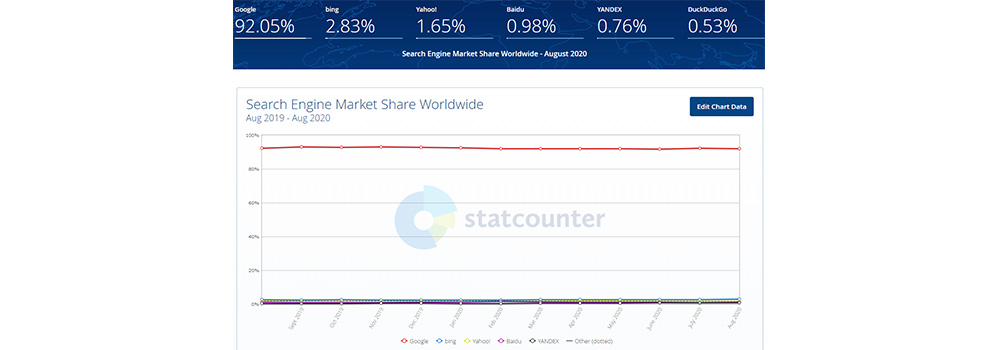Evaluating the Value of SEO | Should you do SEO for your Website?

Author : John Prabhu 29th Sep 2020

Google is dominating the Search Engine Market share and its algorithm is constantly evolving. It continues to do so with the help of AI and advancements in machine learning. In the current world scenario, it has become even more difficult to make it to the top of Google’s first page.

The advancements in Google’s search engine algorithm make it a better answering machine to its users. But, it has become challenging for the content creators. Also, if you’re in a dilemma about investing in SEO, here’s why you should invest in SEO.
The Value of SEO
The value of SEO is directly related to your business goals and the business-specific things that will help you get to Google’s first page. It might be app store optimization, content marketing, local search, technical optimization, etc. Having said that, you must show performance improvements to keep your campaign up and going.
Some of the best ways to prove the value of SEO is:
- Using paid search data to show the cost of acquiring the traffic through paid search.
- Using an ROI model to show incremental improvements.
- Run a pilot SEO campaign with a test budget.
- Check how competitors win through different SEO strategies and tactics.
- Back up your performance and results through reporting.
1. Cost to Acquire the Keywords through Paid
Cost to acquire the keywords through paid search is one of the ways to know the value of your SEO campaign. If you’re not ranking for certain keywords, you can compare it to the cost of getting your traffic from paid search. It is worth your time to go behind those keywords organically because acquiring traffic through paid search is not that economical.
To estimate the value:
Firstly, analyze the number of keywords available for paid search in the segment.
Secondly, find out how frequent these keywords are searched for in a year.
Thirdly, find out the average CPCs for these keywords to break down the model into different market share to see how much it would cost.
Finally, calculate the cost to acquire
2. ROI Model
Another model through which you can prove the value of SEO is ROI Model. This model shows incremental gains in impressions, traffic (clicks), and revenue.
You can approach this with the help of a spreadsheet wherein you can aggregate all the data for all your keywords or your top-performing keywords on your search console.
While using this method, you can use the click-through and conversions by search engine for every keyword. The goal of the keyword method is to aggregate the keywords for which a domain is ranked in organic search and then identify high value.
Soon after the identification of keywords, you must categorize them into suitable headings so that you can create content on that topic and all other related topics. As a result, it helps in improving the domain’s rankings for those keywords and drives more conversion.
Methodology
If the organic search data is not available, you can collect these data from paid search reports or other conversion related information to augment organic reporting/conversion data. When you use paid search report data, you can significantly estimate the true conversion potential of a keyword.
Potential data sources include:
Domain search rank: Ahrefs, SEMrush.
Share of clicks by SERP#: Based on best industry data available.
Keywords: Internal site search, analytics, SEMrush, DataCube, Ahrefs, Google Keyword Tool, Keyword Surfer.
Conversion: Analytics, conversion reporting tools, Google Ads data, client estimates.
Average monthly searches: SEMrush, DataCube, Ahrefs, Google Keyword Tool, Keyword Surfer.
3. Get a Test Budget
Test Budget is another efficient way to assess the value of SEO.
Witnessing fruitful results through pilot SEO campaigns with the test budget will help you to predict your long-term achievements. You must also remember that SEO is a long-term process and not immediate. So, initially you will get only small wins, which is sufficient enough to stay motivated and do it further for improved organic performance.
An example test that you can run on your website is to include five high-quality links to an already optimized page that has no links. Make sure you measure the difference between the before and after results on ranking after one or two months.
An example test that you can run on your website is to include five high-quality links to an already optimized page that has no links. Make sure you measure the difference between the before and after results on ranking after one or two months.
You can also do other similar tests using content and off-page techniques to identify increase in keywords and other performance metrics over time.
Search Query Data
You can witness your progress every month by comparing it to previous month through Google’s search console, which gives the impression, clicks, queries, and other data points.
After your analysis, you should do the following:
Write more relevant content for a page to be more relevant for your target keywords.
Creating a holistic content that understands the user intent and answers it completely.
Get familiar with Google Search Console and monitor the keywords/phrases that grow along with your target keywords.
4. Show Competitor Winnings
Another way of assessing the value/importance of SEO is to do a general competitor research and study their dominance in the SERPs.
You can easily study your competitor’s performance on SERP using third-party tools and evaluate the value of doing SEO for your website.
If your competitors are implementing content marketing strategies to outperform you on search engines, it means they are witnessing fruitful results from implementing SEO best practices. Ignoring SEO will only lead to your competition pulling more potential customers from you.
When you look at the traffic and conversion they are getting through SERP (that is organically), you can evaluate the business you’re losing out.
5. Backing Up Your Data Through Reporting
The improvements gained through impressions and clicks from Google Search Console is a great way to get data. Also, there are other ways of showing improvements as well.
There are third-party tools that let you collect the data such as what your rankings were in the past and what they are now and analyze if it has changed.
Another similar comparison would be checking your website’s performance for a specific keyword now vs. 3 months ago or 6 months ago.
When your site starts to perform well on SERPs and improves rank, you can expect more quality traffic and they might lead to conversions once you start dominating Google’s first page.
Conversion Rate
Witnessing improvements in conversion rates is also a good metric to continue implementing SEO best practices.
Traffic & Conversions
With the help of analytics, you can witness improvements in organic traffic and a lift in conversions regardless of hard or soft conversions (newsletter signups, brochure download, sales, etc.). This only further emphasizes that continuing SEO will improve your business over time through organic search.
Final Thoughts
It is evident that SEO is not immediate and it is a long-term process. The efforts that you put in to perform organically on SERPs will directly uplift your visibility, conversion, and other meaningful metrics. When you put in extra effort and find quick wins, you will be creating a path to SEO success on your own.
We, at TechAffinity, have expert digital marketing experts who can hand-craft the SEO process and best practices for your business. By understanding the nature of your business, our tailor-made SEO solutions will fetch you success incrementally and consistently. If you’re confused whether to implement SEO best practices for your website, then feel free to schedule a meeting with our experts today. You can also email your queries to media@techaffinity.com.
